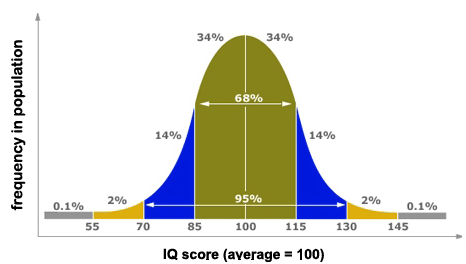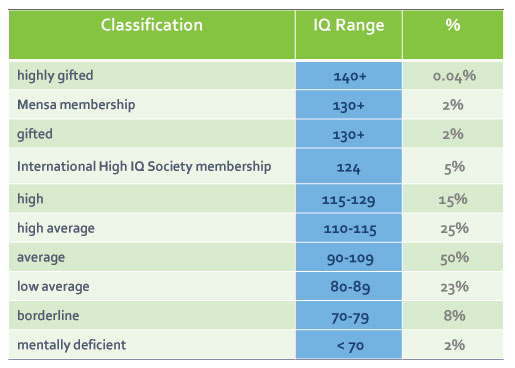Definitions of General Intelligence (G) – The G Factor
52 experts in the field of intelligence have defined general intelligence as as:
…a very general mental capability that, among other things, involves the ability to reason, plan, solve problems, think abstractly, comprehend complex ideas, learn quickly and learn from experience.
General intelligence may more generally be defined as:
Your ability to reason, problem solve, decide, learn & act successfully in the pursuit of your valued goals.
David Wechsler – the creator of the most widely used psychometric IQ test, the WAIS – defined intelligence as:
The global capacity of the individual to act purposefully, to think rationally and to deal effectively with his environment.
An excellent collection of definitions of general intelligence and IQ is found in the paper A Collection Of Definitions Of Intelligence.
IQ Tests and General Intelligence (G)
While people have different cognitive strengths and weaknesses, psychologists have found that there is a common component called ‘general intelligence’ or ‘G‘. Individuals differ in their ‘G Factor’ & valid IQ tests give a good measure of those individual differences.
IQ tests are widely used in our society. Universities use IQ tests (e.g. SAT) to select students, companies use IQ tests (job aptitude tests) to screen applicants, and high IQ societies such as Mensa use IQ test scores as membership criteria. IQ scores have a distribution that looks like a bell curve.
.
IQ tests are designed so that the average IQ score is 100. In this graph, you can see that 68% of the population has an IQ score between 85 and 115. Around 2% of the population has an IQ greater than 130 which is a ‘very superior’ intelligence or ‘gifted’ intelligence. This is the IQ score needed to become a member of Mensa. An IQ of 115 or more is considered a high IQ.
Here is a table for what IQ scores mean:
IQ tests are the most reliable and valid type of psychometric test that psychologists make use of. Score on an IQ test can be used to predict ability in a wide range of activities outside the classroom. Here is a list of factors that have been found to be positively (blue) or negatively (red) correlated with IQ – in alphabetic order.
POSITIVE IQ CORRELATES:
- Achievement motivation
- Altruism
- Artistic preferences and abilities
- Craftwork
- Creativity
- Dietary preferences (low-sugar, low-fat)
- Educational attainment
- Eminence, genius
- Emotional sensitivity
- Extra-curricular attainments
- Health, fitness, longevity
- Humor, sense of
- Income
- Interests, breadth and depth
- Involvement in school activities
- Leadership
- Learning ability
- Linguistic abilities
- Logical abilities
- Marital partner, choice of
- Media preferences (newspapers, TV channels)
- Memory
- Military rank
- Moral reasoning and development
- Motor skills
- Musical preferences and abilities
- Occupational status & success
- Perceptual abilities (for briefly-presented material)
- Practical knowledge
- Reading ability
- Social skills
- Sports participation
- Values, attitudes
NEGATIVE IQ CORRELATES:
- Accident-proneness
- Acquiescence/obedience
- Alcoholism
- Authoritarianism
- Crime
- Delinquency
- Dogmatism
- Hysteria vs other neuroses
- Impulsivity
- Infant mortality
- Psychoticism
- Racial prejudice
- Smoking
- Truancy
- Weight height ratio, obesity
Subscribe for free eBooks on IQ and IQ augmentation


